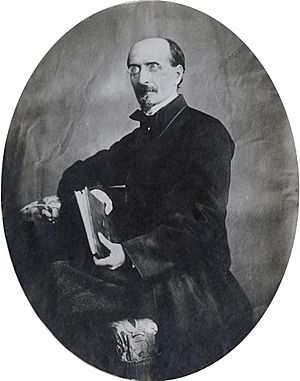Ventura Ruiz Aguilera facts for kids
Ventura Ruiz Aguilera (born 1820, died 1881) was a Spanish poet. He was known for writing poems that expressed strong feelings and ideas. Some people even called him "the Spanish Béranger," comparing him to a famous French poet named Pierre-Jean de Béranger.
About Ventura Ruiz Aguilera
Ventura Ruiz Aguilera was born in 1820 in a city called Salamanca in Spain. He studied medicine there and finished his degree.
In 1844, he moved to Madrid, the capital of Spain. There, he started writing for newspapers about politics. He also worked in important government jobs when political groups who believed in more freedom and rights were in power. Later, he became the director of the National Archaeological Museum in Madrid. This is where he passed away on July 1, 1881.
His Poetry and Books
Ventura Ruiz Aguilera became quite popular with his first collection of poems, called Ecos Nacionales (which means "National Echoes"), published in 1849. In these poems, and in the newspapers he managed, he tried to inspire people to feel proud of their country.
Another book of his poems, Elegías y armonías (1863), was also very successful. However, his later works, like Sátiras (1874) and Estaciones del año (1879), showed that his writing was not as strong as before.
He also wrote several short novels and other prose works. Some of his selected poems were published in collections like Inspiraciones (1865) and Poesías (1880).
Ventura Ruiz Aguilera was influenced by another poet named Lamartine. He wrote about ideas like freedom and Christian values in his poems. Even though his poems might not have been super powerful, they showed that he was a sincere person with a charming way of expressing himself.
List of His Works
- El grito de la conciencia
- Del agua mansa nos libre Dios, 1847
- Bernardo de Saldaña, 1848
- Un conspirador de a folio, 1848
- Camino de Portugal, 1849
- La limosna y el perdón, 1853
- El beso de Judas, 1860
- Obras poéticas. Elegías, 1862
- Proverbios ejemplares, 1864
- Armonías y cantares, 1865
- El mundo al revés, 1865, 2 v.
- Inspiraciones: poesías selectas, 1865
- La arcadia moderna, 1867
- Cuentos del día, 1868
- "Balada de Cataluña", 1868
- El libro de la patria, 1869
- La leyenda de Noche-Buena, 1872
- Las estaciones del año, 1879
See also
 In Spanish: Ventura Ruiz Aguilera para niños
In Spanish: Ventura Ruiz Aguilera para niños
 | James Van Der Zee |
 | Alma Thomas |
 | Ellis Wilson |
 | Margaret Taylor-Burroughs |


